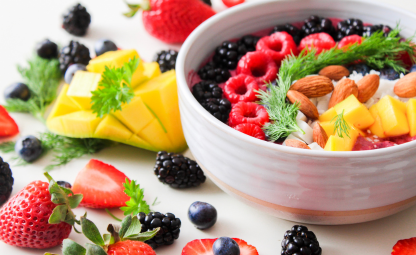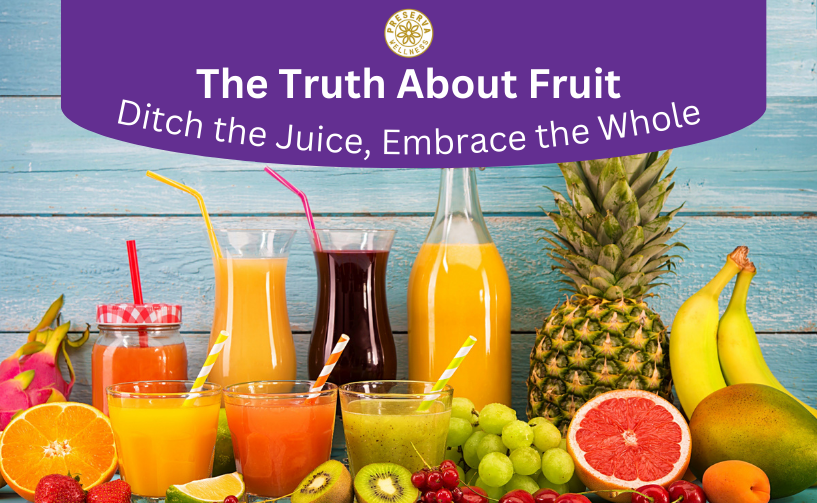We've all been there. Standing in the grocery aisle, faced with a sea of colourful options. Reaching for the juice box instead of the sugary soda feels like the "healthy" choice, right? But is fruit juice truly the wholesome alternative it seems? Let's peel back the layers and understand the sweet truth about fruit, sugar, fibre and their impact on our bodies.
Beyond the Surface: Solid vs. Liquid Fruit
Fruits and fruit juices share a fruity heritage, but their effects on our bodies are vastly different. Imagine a juicy apple. You're not just getting fructose (a form of sugar), you're also getting a healthy dose of fibre, vitamins, and minerals – a nutritional team effort. The fibre acts like a traffic cop, slowing down sugar absorption into your bloodstream and keeping you feeling fuller for longer.
Fruit juice, however, undergoes a processing transformation. Most of its fibre gets left behind, creating a sugary concoction that enters your bloodstream at lightning speed. This sugary surge leaves you feeling unsatisfied and craving more, like a sugar rush without the brakes! Additionally, the extraction process can even reduce the vitamin and mineral content of the juice.
Navigating the Juice Jungle: Not All Juices Are Created Equal
Supermarket shelves are overflowing with various juice options, but are any of them truly healthy? Let's explore the common types to understand their strengths and weaknesses:
- Commercial Fruit Drinks: These are the sugary imposters of the juice world. They often contain minimal real fruit juice (less than 15%), water, a medley of sweeteners (like high fructose corn syrup – a problematic sweetener linked to health issues), artificial flavours, and colours. They might taste fruity but offer little to no real nutritional value.
- Cold-Pressed Juices: Marketed as the "good guys" of the juice aisle, these juices use mechanical pressing to extract juice without heat. This method retains more natural fruit juice and some nutrients compared to other options. However, the lack of fibre and rapid sugar absorption remain concerns. Additionally, their nutritional value degrades quickly over time, so they're best consumed fresh.
- Homemade 100% Fruit Juice: While seemingly the healthiest option, even this juice lacks the crucial fibre of whole fruit. While it might retain some vitamins and minerals, the rapid sugar absorption is a drawback.

Fruits and Sugar Spikes: Friend or Foe?
If fruit juice derived from fruit needs caution due to sugar spikes, shouldn't the same apply to whole fruits? Here's the key difference: the type of sugar.
Fruits contain natural sugars, but unlike the added sugars found in sweets and sodas, they come packaged with a natural regulator – fibre. This fibre slows down sugar absorption, preventing blood sugar spikes. Additionally, fruits are low in energy density, meaning they fill you up without overloading on calories.
The Glycemic Index: A Fruity Tale
The glycemic index (GI) measures how quickly a food raises blood sugar levels. Whole fruits typically have a medium GI, while fruit juices have a high GI. This reinforces the point – fibre in whole fruits slows down sugar absorption, keeping blood sugar levels stable.
Fruits and Weight Management: Busted Myths
The fear of fruit leading to weight gain is a common misconception. In reality, opting for a piece of fruit over a sugary snack can actually support weight management. The natural sugar in fruit is part of a balanced package that promotes satiety and a healthy diet compared to many processed alternatives.
The Final Squeeze: Choose Whole Over Juice
While fruit juice might seem like a convenient way to get your daily dose of vitamins, it's important to remember – whole fruits are the real champions. They provide a complete nutritional package with fibre, vitamins, minerals, and natural sugars that work together to keep you healthy and satisfied. So, next time you reach for a drink, ditch the juice box and grab a piece of nature's candy!

Bonus Tip: Make Fruits Fun!
Getting your daily dose of fruit doesn't have to be boring. Here are some ideas to make fruits a fun and delicious part of your diet:
- Fruit Kebabs: Thread a variety of colourful fruits onto skewers for a visually appealing and portable snack.
- Frozen Fruit Smoothies: Blend frozen fruits with yoghurt or milk for a refreshing and nutritious drink.
- Fruit Salad with a Twist: Jazz up your fruit salad with a sprinkle of nuts, seeds, or a drizzle of honey.
- Fruity Yogurt Parfait: Layer yoghurt, granola, and sliced fruits for a layered breakfast or snack.
By incorporating these tips and embracing whole fruits, you can unlock a world of taste, nutrition, and a healthier you!






